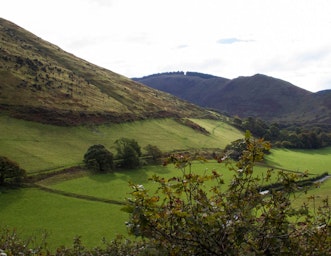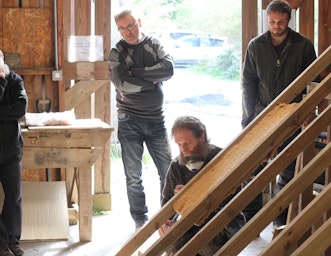
In our third and final blog reflecting on COP26, some friends and staff of CAT’s Graduate School of the Environment share their thoughts.
After two weeks of discussion, debate and protest, we asked some of those who were in Glasgow for their views on COP26. Some chose to take an initial look at the Glasgow Climate Pact, adopted after intense negotiations from the nearly 200 countries in attendance, while others highlighted some of the inspirational events they attended.
You can read an overview of the decisions, agreements and deals reached at COP26 in our recent blog.
Dr Scott Leatham – Senior Lecturer, Graduate School of the Environment
We are being asked to accept the small, stumbling steps made at COP26 as a “success” when giant leaps were needed. We must resist these narratives. At the same time, we have to resist simply blaming India for watering down commitments to end coal. Let’s be clear: 25 COPs have come and gone and fossil fuels have not been mentioned in any of these agreements. At the same time, COP26 failed to institute a mechanism for “loss and damage” – that is, a process by which impacted communities can seek money from the countries most responsible for the losses and damages inflicted on them (the most vulnerable and least responsible).
The Glasgow Climate Pact failed to integrate justice principles or processes or to recognise the land rights that are desperately needed to avoid some of the harmful impacts of offsetting. This is the context in which we must see these very minor steps forward.
A world with warming limited to 1.5°C is still possible, but the window to 1.5°C is rapidly closing, and we must be sprinting directly at it, not stumbling vaguely.
For these reasons, I take the most hope and inspiration from the organisation, events and moments of the “fringe”, the Peoples’ Summit, the marches, and the solidarity.
Building grassroots movements and recognising global solidarity is more important than ever.

Judy Ling Wong – Guest Lecturer, Graduate School of the Environment and Honorary President of the Black Environment Network
We have come a long way since the murder of George Floyd in May 2020, which led to Black Lives Matter initiating an extraordinary worldwide impetus to action for diversity, equality and inclusion.
Let us note that ours is a multicultural world, in which white people make up only 11% of the world population. Just as our diverse communities in the UK have increasingly found their voices, diverse nations at COP26 have similarly articulated the dimensions of a just transition to zero carbon, pointing to the historical responsibilities of wealthy nations for CO2 emissions. The progress made forges a challenging, positive atmosphere of purposeful work towards climate justice.
Black Lives Matter asserts that all change has to be structural. We see the vocabulary, and potential mechanisms for equity set within the climate change context, emerge in the Glasgow Climate Pact, including “loss and damage”, and “a just transition”. However, the full manifestation of equity is yet to come. The few rich countries have, so far, voted down a loss and damage package for the many already feeling the devastating effects of the climate crisis. The promised £100billion annual support fund for poorer countries is delayed. The historical struggle for a fair and equal world continues.

Jo Becker – CAT graduate, PhD student in de-growth, and co-founder of the YIKES podcast
I am writing this with a heavy heart as COP26 comes to an end. COP26 was hosted by the country with the longest industrial history and some of the biggest climate debt (the debt owed by countries like the UK in the Global North for the damages caused by their contribution to climate change). COP26 should have been a starting point of reconciliation and justice restoration. Instead, it was coined one of the most exclusionary COPs in history for access, participation, and silencing of voices inside and outside the conference. The UK and other rich, polluting nations also actively blocked proposals for a Loss and Damage Facility, that should have provided minimum funds for those experiencing climate catastrophes right now. Furthermore, they continued to blame other countries for using coal whilst covering up their own reliance on fossil fuels (and the planning of new extraction sites such as the CAMBO field).
And so, whilst the negotiations themselves failed to deliver the necessary targets, outside we built a mass movement of climate justice from the ground up. Ordinary, committed people and organisations did more for our planet in enabling the People’s Summit than our governments did for this and other recent COPs. From all over the world we travelled and gathered in strength and determination to break with the old systems and pursue climate justice.
This should serve as another reminder that we already have all the solutions within our communities to prevent catastrophic climate change. No technology will save us – we are the ones creating change from the ground up. We will rise, and we will do it collectively.

- Zero Carbon Britain
- Climate Change
Related Topics
Related Pages
Related news


CAT Conversations: Sandy Stevens, CAT graduate
17th April 2025
CAT stories – Nick Parsons and Mike Russell
29th January 2025
‘The finance COP’
29th November 2024EMAIL SIGN UP
Keep up to date with all the latest activities, events and online resources by signing up to our emails and following us on social media. And if you'd like to get involved and support our work, we'd love to welcome you as a CAT member.
